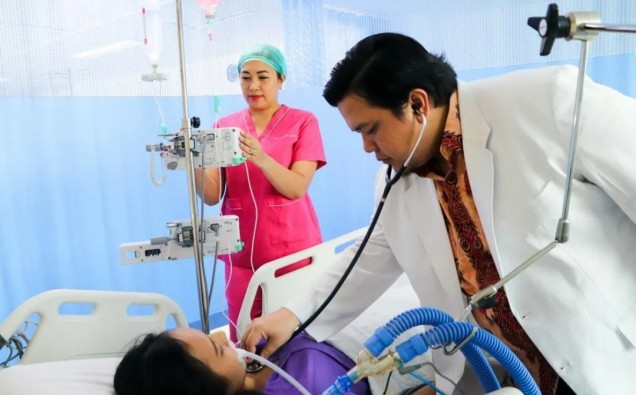A virulent new strain of antibiotic-resistant bacteria that causes severe disease could be spreading widely across Asia – posing significant challenges to global public health, a new study reveals.
Researchers discovered the ST164 variant of Carbapenem-resistant Acinetobacter baumannii (CRAB) in a Chinese intensive care unit (ICU) as part of their study into how bundled infection prevention and control (IPC) measures affected the spread of CRAB.
Over a three-month period in 2021, the experts conducted extensive genomic surveillance, within the ICU in Hangzhou, revealing that 80.9% of the or A. baumannii bacteria found in patients were CRAB, with ST164 accounting for 40.2% of samples.
Publishing their findings in Nature Communications, researchers from the University of Birmingham and Zhejiang University reveal that other hospital wards and transferred patients could be sources of new CRAB strains entering the ICU.
CRAB poses a serious risk to hospitalised patients and can cause severe disease including pneumonia, urinary tract infection, bacteraemia, meningitis, and soft tissue infections. Ongoing IPC measures are vital for controlling these bacteria’s spread within hospitals and further research needed to understand how these strains evolve in hospital environments.
Professor Alan McNally – University of Birmingham
The study follows the team’s previous research at the Hangzhou ICU in 2019, which showed that almost one-third of patients were infected by CRAB.
Latest research shows one strain type (GC2) among CRAB isolates fell from 99.5% in 2019 to 50.8% in 2021. The remaining population mainly consisted of ST164 isolates that have been evolving since mid-2020 and have twice the levels of measurable resistance to carbapenems that the GC2 strains have.
Co-author Professor Alan McNally, from the University of Birmingham, commented: “We believe that ST164 is becoming established in ICU settings and may be spreading widely across Asia. While ST164 caused fewer infections than GC2 during the study period, its high levels of antibiotic resistance indicate it needs careful monitoring.
“CRAB poses a serious risk to hospitalised patients and can cause severe disease including pneumonia, urinary tract infection, bacteraemia, meningitis, and soft tissue infections. Ongoing IPC measures are vital for controlling these bacteria’s spread within hospitals and further research needed to understand how these strains evolve in hospital environments.”
The research was supported by funding from the Medical Research Council and the National Natural Science Foundation of China. The study involved high-resolution whole-genome sequencing and comparative analysis of CRAB isolates.
CRAB can persist for prolonged periods on hospital surfaces and medical equipment and colonise patients within 48 hours of admission – facilitated by hospital staff, shared equipment, airflow, and plumbing. Outbreaks of CRAB can require interventions or changes to infrastructure that impose clinical, logistical, and financial burdens.
Antibiotic-resistant infections are a major threat to global public health. CRAB infections are found worldwide with severely limited treatment options prompting the World Health Organisation to designate CRAB a priority organism for which novel therapeutics are urgently required.
Co-author Professor Willem van Schaik, from the University of Birmingham, added: “The health implications of CRAB, especially the ST164 clone, are profound, affecting patient outcomes, healthcare systems, and public health globally. In the absence of new therapeutic agents, effective CRAB IPC strategies are vital if we are to limit the morbidity and mortality caused by the bacteria in hospitals. In addition, our study illustrates the power of genomic surveillance to map the emergence and dissemination of this drug-resistant clone.”
Antibiotic-resistant bacteria could pose major health threat across Asia
A virulent new strain of antibiotic-resistant bacteria that causes severe disease could be spreading widely across Asia – posing significant challenges to global public health, a new study reveals....
2024-11-10
No Comment
RELATED BY
-
Adopt Birmingham praised by Ofsted: Maintains ...
Birmingham City Council is proud to share that Adopt...Posted 2 days ago -
Working hard to collect waste in 2025
Our waste crews have collected an average of around...Posted 4 days ago -
Council welcomes government measures to make ...
Local authorities are to be given new powers to...Posted 5 days ago -
Holocaust Memorial 2026 commemoration event a ...
Birmingham’s annual civic commemoration of Holocaust Memorial Day will...Posted 5 days ago
-
Dr N U Haque & Partners Patient engagem ...
We’re thrilled to share that we raised over £500...Posted 2 months ago -
New data shows decline in smoking rates in Bi ...
New figures from the ONS, show that the smoking...Posted 2 months ago -
“Find Freedom From Smoking”: New Campaign ...
Birmingham City Council has launched a campaign to help...Posted 3 months ago -
Sandwell community comes together for charity ...
The Sandwell community came together for a charity penalty...Posted 3 months ago
-
Adopt Birmingham praised by Ofsted: Maintains ...
Birmingham City Council is proud to share that Adopt...Posted 2 days ago -
Working hard to collect waste in 2025
Our waste crews have collected an average of around...Posted 4 days ago -
Council welcomes government measures to make ...
Local authorities are to be given new powers to...Posted 5 days ago -
Holocaust Memorial 2026 commemoration event a ...
Birmingham’s annual civic commemoration of Holocaust Memorial Day will...Posted 5 days ago
LATEST REVIEWS
-
2025-12-22
-
2025-12-22
-
2025-12-19
-
2025-12-18


















